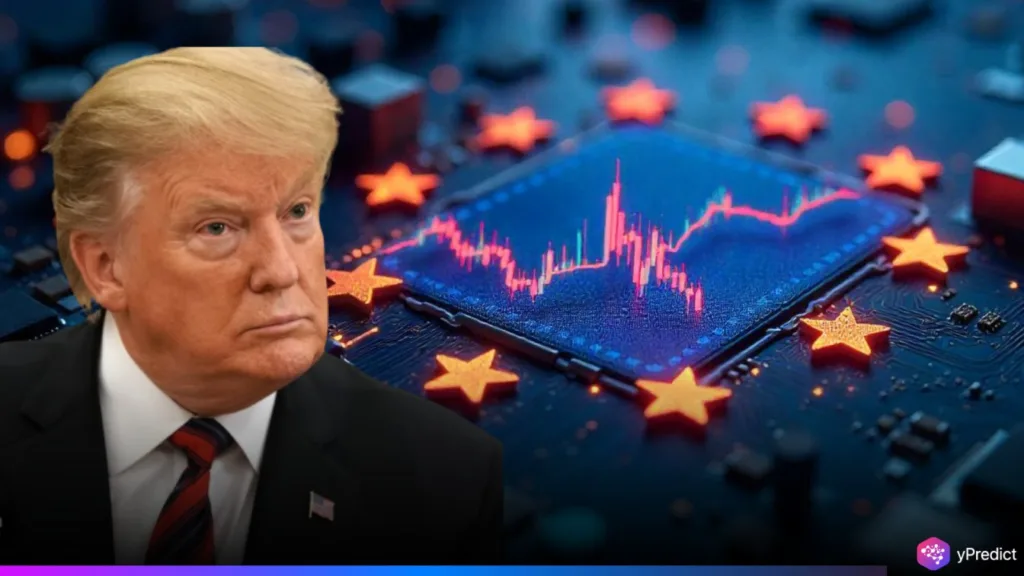
Global markets surged on Monday following the Trump-EU tariff delay, which postponed a planned 50% levy on European imports until July 9. The announcement provided a temporary boost to investor sentiment, lifting European and Asian stocks, strengthening the euro, and easing concerns over escalating trade tensions.
While the move calmed immediate fears, analysts warn it may be a short-lived reprieve without substantive progress in trade negotiations. The euro surged while equity markets in Europe and Asia posted mixed performances, reflecting investors’ uncertainty over the erratic trajectory of U.S. trade policy.
Global Markets Rally Following Trump EU Tariff Delay
According to Reuters, Asian equity markets showed stability on Monday, and the euro climbed after U.S. President Donald Trump unexpectedly postponed a proposed 50% tariff on European Union imports. The extension pushes the deadline to July 9, giving both sides more time to continue trade negotiations.
The decision followed a conversation with European Commission President Ursula von der Leyen, who emphasized the EU’s need for additional time to reach what she called a “good deal.”
The move comes following heightened market volatility in recent weeks, which was fuelled by concerns over aggressive US trade policy. Investors had regained some confidence following agreements with the United Kingdom and China, but Trump’s unexpected moves have kept markets on edge. Analysts observe a growing trend of capital migrating out of U.S. assets and into Europe and Asia, amid concerns about a future American recession and a worldwide economic slowdown.
In a note to clients, Commerzbank branded the administration’s policy approach as “unpredictable and incoherent,” reflecting broad market discontent. According to Tim Waterer, chief market analyst at KCM Trade,
A clear pattern has emerged when it comes to Trump’s tariff strategy – hefty tariff threats soon followed by tariff pauses during which negotiations ensue. So investors are getting to know the Trump tariff playbook quite well, with his back-and-forth with the EU in this matter being the latest such example.
Currency and Commodity Markets Respond
Asian equities were mixed on Monday, with the MSCI index tracking Asia-Pacific shares outside Japan slipping marginally by 0.07%. In contrast, European markets signaled strong early momentum, as futures for the Euro Stoxx 50 and Germany’s DAX both advanced by more than 1.5%, reflecting renewed investor optimism following a temporary halt in U.S. tariff escalation.
In currency markets, the euro rose 0.35% to $1.1404, its highest level since April 30, boosted by improved sentiment towards the European economy. Risk-sensitive currencies, such as the Australian and New Zealand dollars, also rose, indicating increased confidence in global markets. Meanwhile, the US dollar dropped, with the dollar index reaching its lowest level since April 22. Analysts believe this trend shows growing scepticism about US trade policies, strengthening what many have dubbed a “Sell America” environment.
Indian Markets and Currency Strengthen
Furthermore, Indian stocks also rose on Monday, boosted by Trump’s decision to postpone slapping 50% tariffs on EU imports, as well as a record dividend transfer from the Reserve Bank of India. The Nifty 50 gained 0.41% to 24,955.2, while the BSE Sensex increased by 0.46% to 82,092.44. All 13 major sectors rose, with metals, auto, real estate, and energy up around 1%, supported by a weaker US dollar.
The Indian rupee strengthened past the 85 per U.S. dollar mark for the first time in two weeks, continuing its rally with a 0.4% rise to 84.82 after a 0.9% surge on the previous Friday. The rupee’s gains came amidst a broader rise in Asian currencies driven by U.S. trade policy uncertainty and a weakening dollar.
Although markets have reacted positively to President Trump’s decision to postpone high tariffs on European imports, analysts warn that the larger outlook is still murky. The temporary delay may have eased immediate market fears, but Washington’s repeated policy reversals continue to erode trust in the global trade environment.







